INmune Bio is set to begin phase two human trials on a COVID-19 treatment in August that takes aim at what many scientists believe is the most lethal aspect of the virus.
"We think the primary problem is actually the blood clots," CEO Dr. Raymond J. Tesi told Cheddar on Thursday. "It's not the lungs. It's not the kidneys."
The small San Diego biotech company specializes in treating different types of inflammation, including another treatment that made headlines this week for showing promise in reducing brain inflammation in Alzheimer's patients. In the case of coronavirus, the company is developing a treatment that targets an immune response called the cytokine storm.
"The cytokine storm is basically a hyper-acute kind of inflammation that's like an atomic bomb going off in the patient," Tesi said. "In causing all of that inflammation, it causes all kinds of problems."
This is the same process that contributed to the high mortality rate of the Spanish Flu in 1918.
While COVID-19 was initially seen as a lung disease, it's now widely understood that it impacts every organ system in the body, Tesi said.
The virus itself is also less lethal than the outsized immune response that it causes in the body. This reaction can cause the inflammation of the endothelial cells — the lining or bricks that make up blood vessels — which can lead to blood clots.
"We believe that the key problem is actually something called the coagulopathy," Tesi said. "All these little blood clots form, and they break off and block the small blood vessels to things like the lung, the heart, the kidneys, the brain, you name it."
INmune's drug targets an immune protein called TNF that is found in inflamed tissue. Other companies have sought to block out the molecule altogether, while INmune pinpoints the most inflammatory form of the molecule, according to Tesi.
The phase two trial will treat 100 coronavirus patients with comorbidities or risk factors such as age, diabetes, and ethnic background, with the goal of treating them before they become intubated. The company is working closely with the FDA to develop the drug as quickly as possible, but Tesi did not provide a date for approving the drug and beginning mass distribution.
"The process of getting a phase two trial up and running a heavy lift for any company, but particularly a small company," he said.












